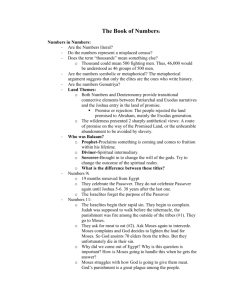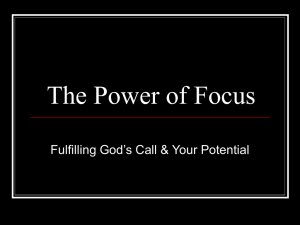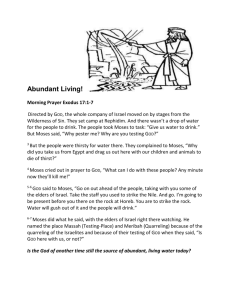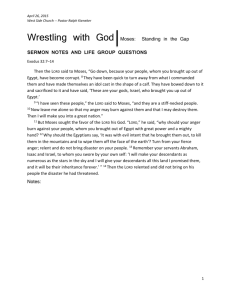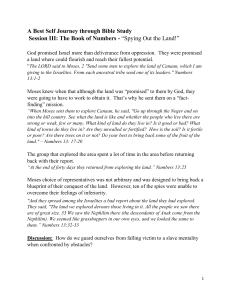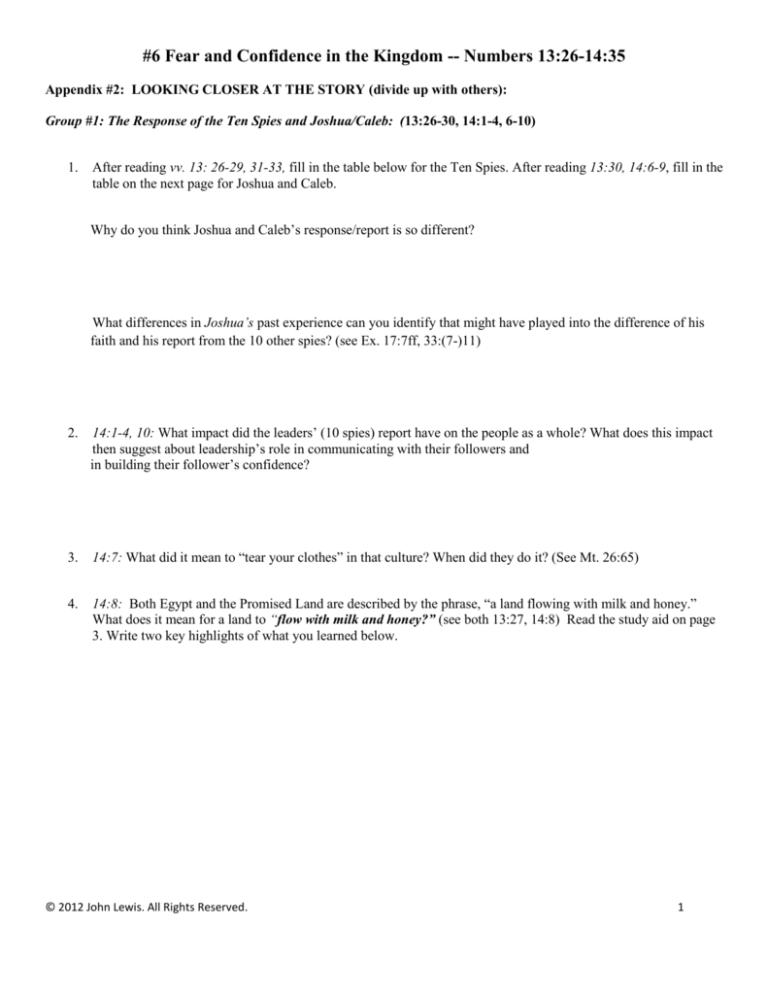
#6 Fear and Confidence in the Kingdom -- Numbers 13:26-14:35
Appendix #2: LOOKING CLOSER AT THE STORY (divide up with others):
Group #1: The Response of the Ten Spies and Joshua/Caleb: (13:26-30, 14:1-4, 6-10)
1.
After reading vv. 13: 26-29, 31-33, fill in the table below for the Ten Spies. After reading 13:30, 14:6-9, fill in the
table on the next page for Joshua and Caleb.
Why do you think Joshua and Caleb’s response/report is so different?
What differences in Joshua’s past experience can you identify that might have played into the difference of his
faith and his report from the 10 other spies? (see Ex. 17:7ff, 33:(7-)11)
2.
14:1-4, 10: What impact did the leaders’ (10 spies) report have on the people as a whole? What does this impact
then suggest about leadership’s role in communicating with their followers and
in building their follower’s confidence?
3.
14:7: What did it mean to “tear your clothes” in that culture? When did they do it? (See Mt. 26:65)
4.
14:8: Both Egypt and the Promised Land are described by the phrase, “a land flowing with milk and honey.”
What does it mean for a land to “flow with milk and honey?” (see both 13:27, 14:8) Read the study aid on page
3. Write two key highlights of what you learned below.
© 2012 John Lewis. All Rights Reserved.
1
Comparing the Reports
The Ten Spies
Joshua and Caleb
1. What did they “see” most?
2. What did they feel most?
3. What is their implied or
direct advice for Israel?
4. What did they put their
faith in most?
5. What is their view of God?
6. What did they “fear” the
most?
What do both groups see and have in common and where do they differ in their focus?
© 2012 John Lewis. All Rights Reserved.
2
HELP TO UNDERSTAND THE STUDY
MILK Milk was part of the staple diet of the Hebrews from patriarchal times, and where there was abundance of milk (Is.
7:22) it was possible to enjoy the added delicacy of cream or curdled milk (Heb. ‘butter’). Hence the attraction of the land
of Canaan as a land flowing with milk and honey (Ex. 3:8), for the rich supply of milk was an indication of the pasturage
available. It might be the milk of cows or sheep (Dt. 32:14; Is. 7:22), goats (Pr. 27:27), or possibly in patriarchal times of
camels also (Gn. 32:15). It was contained in buckets, if RVmg. is the correct rendering of the Greek LXX in Jb. 21:24, and
in skin-bottles (Jdg. 4:19) from which it could conveniently be poured out for the refreshment of strangers (Gn. 18:8) or as
a drink with meals (Ezk. 25:4). It is frequently coupled with honey, and with wine (Gn. 49:12; Is. 55:1; Joel 3:18), with
which it may sometimes have been mingled as a rich delicacy (Ct. 5:1). The phrase ‘honey and milk are under thy tongue’
(Ct. 4:11) refers to the sweet conversation of the loved one. Its metaphorical use to describe the land of Canaan has been
mentioned; Egypt was also so described by the embittered Israelites during the years of wandering (Nu. 16:13).
HONEY, HONEYCOMB A favorite *food in biblical times (Pr. 24:13; cf. Ecclus. 11:3), honey was found in hollows of
the rocks (Dt. 32:13; Ps. 81:16); in trees (1 Sa. 14:25-26, though the Heb. text here is obscure); in the wilderness of Judaea
(Mt. 3:4; Mk. 1:6); and in animal carcasses (Jdg. 14:8).
Honey was used in cake-making (Ex. 16:31), and was regarded as having medicinal properties (Pr. 16:24). It was as
acceptable gift (2 Sa. 17:29; 1 Ki. 14:3); a valuable resource (Je. 41:8); and was evidently plentiful enough to be exported
(Ezk. 27:17, but some suggest that in this verse and in Gn. 43:11 grape or date syrup may be intended; cf. Jos., BJ 4. 469).
It was forbidden as an ingredient of any meal-offering to Yahweh (Lv. 2:11) because of its liability to fermentation (so
Pliny, NH II. 15), but included in tithes and first-fruits (2 Ch. 31:5), which incidentally suggests domesticated bees
(*Animals). In later times bee-keeping may have been practiced by the Jews.
Canaan is spoken of as a land ‘flowing with milk and honey’ (Ex. 3:8, etc.; cf. ANET, pp. 19-20), for a discussion of
which see T. K. Cheyne’s note (EBi, 2104). Goshen is similarly described (Nu. 16:13).
Honey as the ‘chief of sweet things’ has inspired many figurative allusions—e.g. Ps. 19:9-10; Pr. 5:3 (cf. Ct. 4:11); Pr.
24:13-14; Ezek. 3:2-3; Rev. 10:9.
© 2012 John Lewis. All Rights Reserved.
3
Group #2: The Response of the Multitudes to these two reports (14:1-4, 9, 10a)
1. 14:1-4: How do the multitudes respond? What do they say? Make a list of their points.
2. v. 14:9: Joshua and Caleb ask the people not to do two things (see the verbs). What are they?
What is the relationship between these two verbs?
What does that imply?
3. 14:10: Cultural/historical context. When did Hebrews get stoned with rocks? See Matt. 21:35, Luke 20:6, John
8:5ff, 8:59, 10:31-33, Acts 7:58-9, 14:19, 5:26.
What do you learn here about what it meant to be stoned in this culture? Write in two lessons below.
What then does this verse (14:10) then suggest about how the people saw Joshua and Caleb?
4. 14:11: What reasons did God “give” Israel not to doubt or grumble? Or to ask the question another way: what did
the Israelites forget that Joshua and Caleb “remembered?” Make a list of at least 4-5 miracles and signs God did
for the Israelites in both the 1st half of the books of Exodus and Numbers.
Clearly one reason the people despaired in part because they had forgotten the goodness of God. Below are some
verses from Deuteronomy on Remembering and Gratitude: see Deut 4:9, 23, 31, 5:5, 7:18, 6:12, 8:2, 11, 14, 18© 2012 John Lewis. All Rights Reserved.
4
19, 9:7, 15:15, 24:9, 32:7. Remembering God/ his deeds and our past as critical to the covenant/renewal in
Deuteronomy…and forever!
Write down a few of the truths about remembering from these verses above.
Can you see how this discipline to remember (see above) would have helped the then spies and the multitudes in
our story? Write down 2-3 connections that you see.
© 2012 John Lewis. All Rights Reserved.
5
Group #3: The Response of Moses to the Multitudes (14: 5, 13-19)
1. v. 14:5: What was Moses’ first response after hearing the report of the ten spies, the “majority” report?
What does that suggest Moses was initially feeling?
2. v. 5: Does Moses’ response surprise you? One would think Moses as leader would see the Promised Land
adventure as Joshua and Caleb do. Do you think he does? Why or why not? What seems to be gripping his heart
here?
3. 14:13-19: Moses responded with a prayer to God. Fill in below the content of this prayer.
v. 19a: What Moses asks God to do:
2 Overall Reasons God should answer Moses’ prayer:
vv. 13-16: Reason #1-
vv. 17-18, 19b: Reason #2-
Consider what motivated his prayer. Do you think the fear of v. 5 is over now? Why or why not?
© 2012 John Lewis. All Rights Reserved.
6
What did he see ahead that the people could not see was coming?
4. How would you describe the kind of leadership Moses took with the people through this prayer?
Was Moses’ prayer the kind of prayer and leadership you expected him to take? Why/why not?
Was there something else you also would have expected him to do in this situation? Be specific.
5. Note that Moses was also learning to fear the Lord in this story, to fear God more than the giants of the Land.
Later in his life, Moses would invite the people of Israel to fear God more than any other army or circumstance in
their life, commanding the people as they renewed the covenant to make primary the fear of the Lord. 40 years in
the desert –including our story today, had taught him how crucial this fundamental decision was. See in the
appendix verses on the Fear of the Lord from the book of Deuteronomy, the record of that covenant renewal.
Read these verses on fear from the perspective of our story today and write below what you learned.
© 2012 John Lewis. All Rights Reserved.
7
Group #4: The Response of God (14: 10b-12, 20-36)
1. Response #1:
14:9, 11, 27: What is God’s verdict of the people and their being afraid of the “giants”? Is this surprising to you?
14:10b: What was the FIRST response of God in this story? Does this surprise you or remind you of Gen. 3 in
any way?
14:12: What does it lead God to suggest as the solution to Moses? Is this surprising to you?
2. Response #2 from God:
14:20-25, 28-35: How does God respond to Moses’ prayer of intercession? I.e., what are the final consequences
for Israel/the 12 spies for their rebellion against God? Fill in below.
1. v. 20:
2. vv. 21-25, 28-35 (Make an extended list of these consequences)
Do you think Moses changed God’s mind by his prayer? What does that suggest about God? About our
relationship with God?
© 2012 John Lewis. All Rights Reserved.
8
v. 22: What suggestion is there that God is not only judging the people here but is also the gracious God described
in v. 18?
What do you think is the reason for such a severe consequence from God for their lack of faith, their believing the
fears of the ten spies about the Promised Land? What would they learn as a people as a result of God’s discipline?
God from the beginning has wanted his people to fear Him above all and not to be afraid of anyone or anything
else. Consider the page of verses from Deuteronomy (see appendix, page 27, the renewal of the covenant years
later that established the fear of the Lord as the bedrock between God and his people. Read these verses on fear
from the perspective of our story today and write below what you learned - i.e., what attitudes and resulting
actions are commanded or written concerning the fear of God? About being afraid of something else?
© 2012 John Lewis. All Rights Reserved.
9


